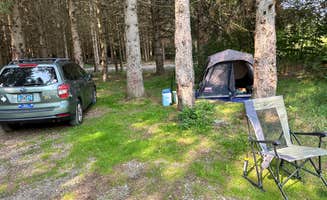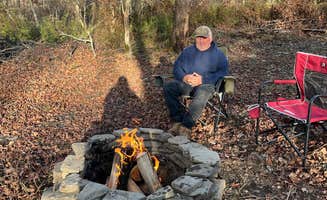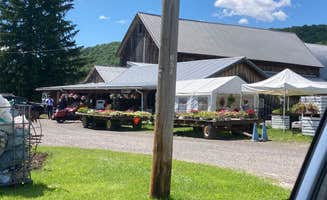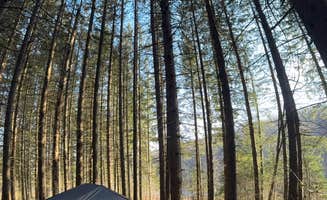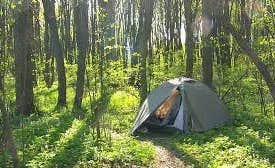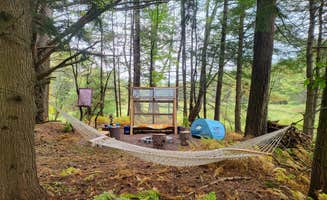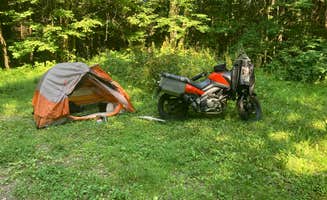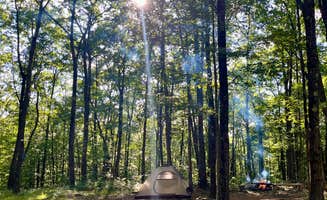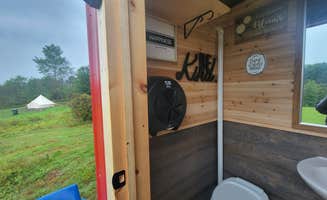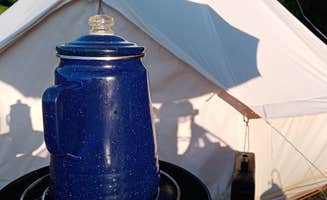Tent campsites near Cincinnatus, New York are primarily scattered across 10,000+ acres of state forest land with elevations ranging between 1,200-1,800 feet. The region experiences a distinct four-season climate with heavy winter snowfall that can exceed 100 inches annually. Most primitive camping spots require preparation for temperature shifts that can vary by 30 degrees between day and night, even in summer months.
What to do
Fishing opportunities: Several ponds throughout the area provide fishing access with different species available. At Long Pond Campground, "the pond is quite large compared to other area ponds, and there are three accesses for fishing: a regular boat launch with parking lot and dock, a carry-in kayak access near campsite 6, and a handicapped accessible fishing pier near campsite 1."
Trail hiking: Many dispersed camping areas connect directly to the Finger Lakes Trail system. At Pharsalia Woods State Forest Dispersed, you can access the trail from Grover Brown Road, though "the Trailhead here for the Finger Lakes Trail is blocked by downed trees that seem to have been there for a while."
Mountain biking: The state forest roads offer extensive riding options. At Bear Wallow Pond Dispersed Campsite, "you can kayak or fish on the pond, go mountain biking on the network of state forest roads that are all part of the Pharsalia Woods Game Refuge."
What campers like
Accessibility options: Some sites offer accommodations for campers with different mobility needs. At Spruce Pond Camping Area, "one is actually handicapped accessible with its own accessible fishing landing and an easy access to the parking lot. There is a brand new outhouse with wide accessible doorway as well."
Wildlife viewing: The ponds attract diverse wildlife, particularly for early risers. At Spruce Pond, one camper noted that "the animals at the pond are very active and made a lot of noise in the night."
No camping fees: Most dispersed sites in the region have no charges. At Nature Lover's Paradise, campers appreciate access to "70 acres of hiking trails" which "sound like the perfect getaway for anyone looking to reconnect with nature."
What you should know
Permit requirements: Some campsites require advance permission. For Jackson Pond Tent Sites, "camping in this DEC Wildlife Management Area is limited, and requires a permit. Visit the regional DEC office at 1285 Fisher Ave., Cortland NY or call 607-753-3095, or email at Info.R7@dec.ny.gov; allow one week for permit to be processed."
Limited facilities: Most sites lack basic amenities. At Long Pond Campground, "There is a port-a-potty near the entrance but otherwise a 'leave no trace' situation which is fine considering the ample forest coverage in case there is someone who drives in."
Cell service variability: Coverage varies significantly by location. One camper at Long Pond reported "T-Mobile service has been exceptional" while other sites have little to no reception.
Tips for camping with families
Site selection: Choose locations with easier access for younger campers. At Spruce Pond, "The first few campsites are the best the further down you go the worse the sites get for tent set up. Smaller tents would be best here."
Weather preparation: The region can experience significant temperature shifts even in summer. Pack extra layers for everyone, especially for camping near higher elevation sites.
Security considerations: Some locations are more secluded than others. At Long Pond, one camper expressed concern about "a lack of privacy as passersby can quite easily pop right in off the highway. This doesn't seem real secure."
Tips from RVers
Access limitations: Most roads to primitive campsites have restrictions. The road to Pharsalia Woods State Forest "is in pretty rough shape, and is marked with a sign that says it is a low maintenance road."
Site sizing: Very few sites accommodate larger vehicles. At Long Pond, "Campsites are level and long enough for a very small trailer. The trees are so thick we could not feed our solar panel."
Alternative parking: For larger rigs, consider using nearby day-use areas as base camps. One visitor noted that several state forests have better developed parking areas at trailheads and fishing access points compared to the camping areas themselves.


